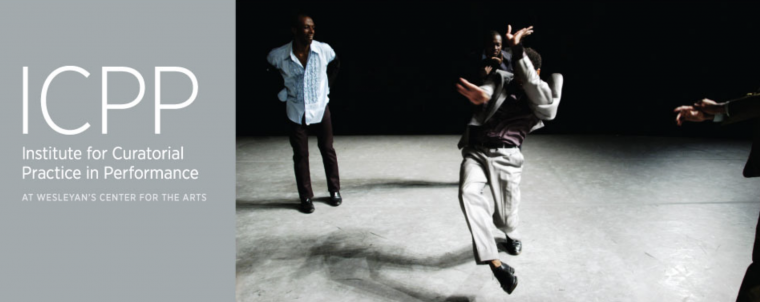Doris Duke Charitable Foundation Supports ICPP’s Performing Artist Case Studies

 Wesleyan’s Institute for Curatorial Practice in Performance (ICPP) has been awarded a two-year, $200,000 grant from the Doris Duke Charitable Foundation.
Wesleyan’s Institute for Curatorial Practice in Performance (ICPP) has been awarded a two-year, $200,000 grant from the Doris Duke Charitable Foundation.
Introduced as a pilot initiative in 2011, the ICPP is the first institute of its kind, a center for the academic study of the presentation and contextualization of contemporary performance. The low-residency program offers students a master’s degree in innovative and relevant curatorial approaches to developing and presenting time-based art.
The grant will be used to support performing artist case studies, working with artists at critical points in their careers to provide analysis of their entrepreneurial strategies, as well as engagement with the economic drivers of cultural production. This funding will further ICPP’s efforts to bring to light different models for artist development, and highlight successful tactics for philanthropic support over the arc of their career. Findings developed during the case studies, including best practices and replicable models, will be shared via a website and print publication, as well as at various conferences.
“As older infrastructure for arts support erodes, performing artists are developing inventive new models for sustaining a career,” said Sarah Curran, managing director of ICPP. “These case studies will allow us to work with artists to both assess and suggest new entrepreneurial strategies, and create and share models of best practice. Our hope is that this process will spark dialogue not only with artists and curators involved in the studies, but also with arts organizations, cultural policy makers, and grant makers about how best to support artists in this shifting arts economy.”
“The continued support of the Doris Duke Charitable Foundation recognizes the impact that the Institute for Curatorial Practice in Performance has beyond the Wesleyan campus,” said President Michael Roth. “These case studies will provide a new assessment of best practices and inventive strategies for the arts.”
Six artist case studies will be completed between July 2018 and July 2020; selected artists and consultants will include a diverse constituency across historically underrepresented perspectives in performance and performance curation. Each artist or company will be paired with a recent ICPP graduate as a consultant to work together for six months. The pair will also work with an experienced mentor who has strong entrepreneurial and consultancy experience. The artist, consultant, and mentor will join ICPP sessions on the Wesleyan campus twice during the academic year.
During their first session on campus, they will meet and identify key issues at stake for the artist. The artist will present their questions and problems to ICPP’s Entrepreneurial Strategies class, and the consultant and mentor will lead a class discussion with the artist. Further work will include a combination of interview and ethnographic work—interviewing the artist, company members, presenters, managers, and other stakeholders as the case demands and the artist allows, as well as observing the artist in practice, both in the rehearsal room and in performance. After synthesizing this information and addressing the state of the field, the consultant and mentor will work with the artist to develop a strategic framework for the next two to five years of the artist’s career, setting up goals as wide ranging as applying for a fellowship to developing a national or regional tour strategy, as well as creating a sustainable plan for health care.
At their second session on campus, the consultant and artist will present their work to ICPP students and faculty. The artist and company members will also be invited for a weeklong residency to develop and present a work in progress. Following the case study presentation, the artist/consultant pair will have another mentor meeting, and then will refine the case study based on the recommendations and discussions.
These case studies will be further refined, published in print and digital formats, and widely disseminated for discussion and distribution in the fields of performance curation and arts philanthropy.
The mission of the Doris Duke Charitable Foundation is to improve the quality of people’s lives through grants supporting the performing arts, environmental conservation, medical research and child well-being, and through preservation of the cultural and environmental legacy of Doris Duke’s properties. The Arts Program of the Doris Duke Charitable Foundation focuses its support on contemporary dance, jazz and theater artists, and the organizations that nurture, present, and produce them.

